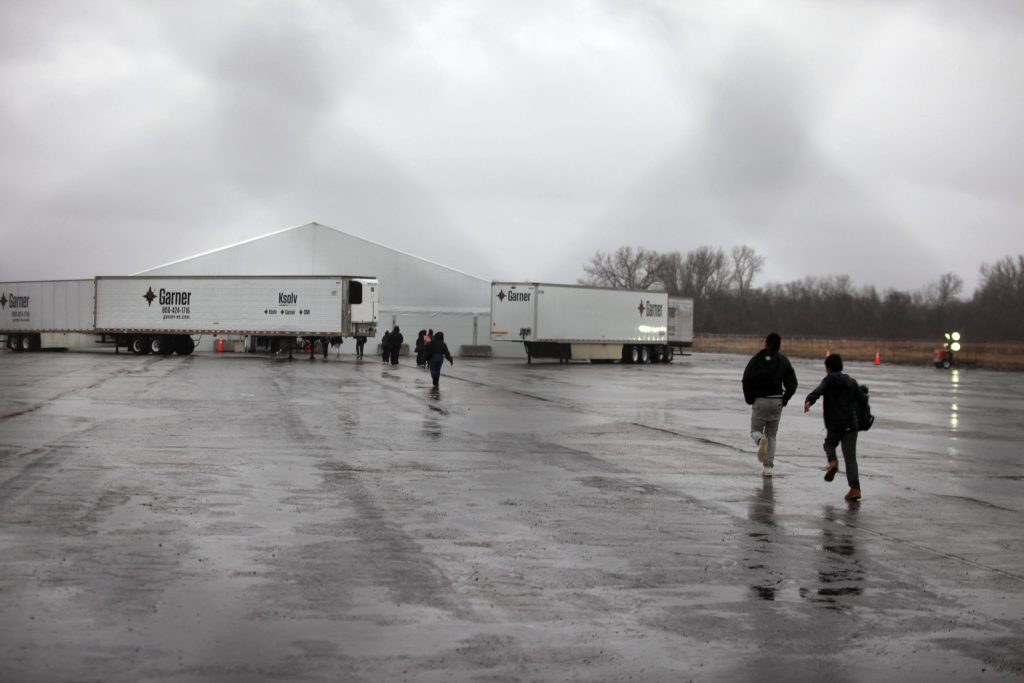New York City will have shut down two dozen shelters in the five boroughs and beyond by the end of March, city officials announced Tuesday morning.
Those include the vast family shelter at Floyd Bennett Field on federal property in southern Brooklyn, which is expected to be moved out by Jan. 15 — five days before President-elect Trump’s inauguration. The giant tents on the site is to be dismantled in the weeks after, according to a City Hall source who was not authorized to speak to reporters.
While the city had just extended an annual lease on the property with the National Parks Service for another year in September, either party had the right to cancel it with a 90-day warning, according to the terms of the lease. City officials intended to give the required warning on Tuesday, the source said.
THE CITY reported in November that local Republicans, who opposed the shelter since before it opened last fall, pledged to push incoming president Trump to end the city’s lease on the property, while advocates rang alarm bells that residents there could prove uniquely vulnerable to Trump’s mass deportation agenda.
In recent weeks, the mutual aid volunteer group Floyd Bennett Field Neighbors, which had been providing clothing and other assistance to residents for more than a year, had begun to mount a pressure campaign on city officials and local electeds to force the city to close Floyd Bennett Field before Trump’s inauguration. In addition to concerns for residents there, they also worried the site could be repurposed as a detention center. In a statement for the group released by the group, Ariana Hellerman, the group’s core organizer, said they welcomed the news of the shelter’s closure.
“We have been in solidarity with the residents of Floyd Bennett Field for a year, advocating for better living conditions with them,” Hellerman said. “We are thrilled to hear this news.”
In addition to the closure of Floyd Bennett Field, which had been previously announced for February, city officials laid out a list of 24 other shelters that either had closed in recent weeks or is slated to close by the end of March.
The number included 15 New York City shelters including as well as another 10 upstate hotels in Albany, Buffalo and Poughkeepsie, among other locations.
Eleven of the shelters on the list have already closed, including one in a warehouse on the JFK airport campus, one at the Essence JFK and another at the Voyage Hotel in Long Island City, while another 14 closures are planned for between now and the end of the March.
The announced closures come as the city has seen a sustained decline in the number of migrants living in city shelters, down by 10,000 from a peak of more than 68,000 people in last December.
In a statement announcing the closures, Mayor Eric Adams thanked the Biden administration for restricting the number of border crossings and credited the city’s 30- and 60-day time limits on shelter stays, as well as the city’s case management efforts, for driving down the number of migrants living in city shelters.
“Thanks to our smart management strategies, we’ve turned the corner, and this additional slate of shelter closures we’re announcing today is even more proof that we’re managing this crisis better than any other city in the nation,” Adams said. “We’re going to continue looking for more sites to consolidate and close, and more opportunities to save taxpayer money, as we continue to successfully manage this response.”
Not on the list of closures was the Hall Street megashelter in Brooklyn, where an estimated 4,000 people live in a complex of warehouses within a one-block radius — an arrangement that has tested the surrounding liberal enclave of Clinton Hill. Neighbors have mounted a growing campaign for the city to reduce the size of the shelter and end the lease with property owner RXR, which expires in March of 2024.
Noah Levine, a spokesperson for the Adams administration, declined to comment on whether the city intended to renew the Hall Street lease, but said that they were looking at how to reduce the size of that e facility.
In addition to closing a number of shelters, THE CITY reported that city officials are planning to phase out the migrant shelter system, which still houses around 57,000 people over the coming months, with the goal of transferring control back to the Department of Homeless Services by the summer of 2026. The specifics of that transfer remain unclear.

